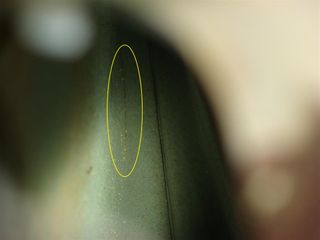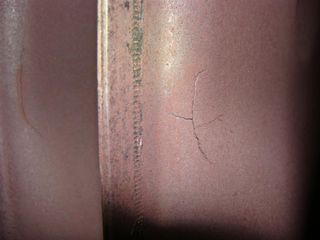I used to recommend furnace certifications all the time, but I don’t do it any more. Heresy you say? No, I have good reason not to. This all started several years ago when I meant to write a blog about what’s involved in furnace certifications and who does them, so I contacted 40 local HVAC contractors.
I was quite surprised at most of the responses I received.
An Easy Call
When I inspect a furnace and I find a serious problem, such as a cracked heat exchanger, it’s easy for me to tell my clients what to do: replace the furnace. The photo above shows a cracked heat exchanger on a furnace, looking at it from the back – this GE furnace had a removable back panel that gave me a good look at the back of the heat exchanger, and made finding cracks very easy.

The Grey Area Unfortunately, diagnosing a cracked heat exchanger is almost always a difficult if not impossible task. Home inspectors are usually only able to see the burner side of the heat exchanger, and this area is often dirty and rusty, making cracks very difficult to find. The photo at right shows a crack as seen from the inside of a heat exchanger, and it’s one of the most obvious heat exchanger cracks I’ve ever seen – yet it’s still tough to see. Home inspection standards disclaim the inspection of the heat exchanger just for this reason, but many home inspectors still do their best to look for problems.
What Excellent HVAC Contractors Do Many years ago, I attended a seminar put on by a very reputable HVAC firm, where the speaker talked about what was involved with a furnace ‘certification’, which was the type of inspection they would do when a home inspector suspected a problem. The guy leading the class talked about using mirrors, borescopes, smoke bombs, leak seek tests, and basically dismantling a furnace to get a good look at the heat exchanger to check for cracks. He assured us that if there was a crack to be found, they were happy to go out of their way to find it, and that’s what a furnace certification was all about.
What Other HVAC Contractors Do To gather information for this blog, I contacted 40 different HVAC contractors. The price for a furnace certification varied between $135 and $219, and almost every contractor said that a furnace certification consists of an Orsat test. That’s it. An Orsat test measures temperature, CO² and 0² in order to determine the efficiency of an appliance, and that’s about it. Some of the more savvy heating contractors might use these numbers to know there is a serious problem… but an Orsat test will not determine the presence of a crack in a heat exchanger. After making all of these phone calls and sending all of these emails, I don’t think I’ll ever recommend another furnace certification. It’s just not enough.
Saint Louis Park has it right In my humble opinion, the City of Saint Louis Park has had it right for a long time; when they do their Point-Of-Sale Evaluations, they automatically require a certification on furnaces over 20 years old, and they also require a smoke bomb or leak seek test, which is specifically designed to test for a cracked heat exchanger.
Don’t Call CenterPoint The local gas company, Centerpoint Energy, offers safety inspections of furnaces for far less than licensed heating contractors. Can you guess why the price is so low? Because it’s not a certification! They won’t do certifications on furnaces, much less smoke bomb or leak seek tests. They also won’t fill out a safety check form for Minneapolis or any other city. Almost half the time I recommend a furnace certification, someone ends up calling the gas company instead, and to no surprise, the gas company says everything is fine. I called CenterPoint to see how it was so easy for people to confuse a certification with a basic safety check, and I was quite surprised. Here’s how the conversation went:
Me: Hi, can I have my furnace inspected?
Centerpoint: Why, did an inspector suspect a problem with it, or are you selling your house?
Me: Yes, the people buying my house want to make sure it’s safe.
Centerpoint: I’m sorry, we don’t offer that type of service. You’ll need to contact a private HVAC contractor.
The gas company was very clear about not offering certifications or anything close to that. So how does the local gas company show up at the majority of houses that I’m recommending certifications on? It’s probably a communication problem. I tell the buyer to get a certification, they tell their agent, that agent tells the seller’s agent, and the seller’s agent tells the seller. The seller eventually hears “Get your furnace checked out”.
From now on, I’ll be recommending leak seek tests when I suspect a cracked heat exchanger. One of the better companies that I contacted does certifications for $135, and they always do smoke bomb tests or leak seek tests when they suspect a problem.
Reuben Saltzman, Structure Tech Home Inspections – Email – Saint Louis Park Home Inspections

